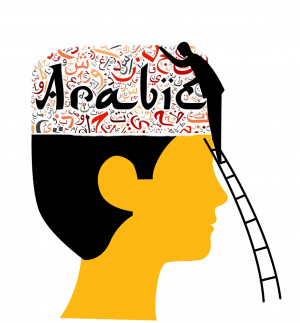Language/Standard-arabic/Vocabulary/8-Memorization-Tips-to-Make-Arabic-Vocabulary-Stick
Here are some of the things that make Arabic vocabulary difficult to learn:
- The alphabet is written from right-to-left. It takes a long time to get used to seeing whole words or sentences in a different alphabet and recognizing them without having to sound them out letter-by-letter. This makes the acquisition of reading skills more time-consuming.
- Arabic has a complex root system. Every word boils down to a 3-letter root (in most cases). This means lots of words that are related look similar. If you try to learn this system by memorizing the chart of all the possible forms of roots, it can be very complex. Most native speakers don’t know the chart and you can learn the language while ignoring this aspect.
One of the major frustrations a student of Arabic faces is “how can I gain/retain all this vocabulary”.
Remember that time you walked out of the classroom and were expected to memorize 40 new words? Your teacher then called on you the next day to make a sentence using the words you were supposed to have memorized and you totally blanked. You realized that simply being exposed to new words is just not enough.
Part of any successful language learning is memorization and this is precisely why students needs to be taught memorization techniques.
Following are the most effective tips that I've seen students use:
Flash Cards
Everyone is familiar with flash cards. Students enthusiastically start with flash cards and by the end of a semester have hundreds of flash cards lying around the house. The reason why flash cards work is because they force the student to recall the sight of the word and its meaning associated with it by constant repetition.
The downside to flash cards however is that although one might be able to recall the word by sight, they might not recognize it by listening.
Hear & Associate
Memorization works best when the word being memorized is associated with something your mind already recognizes. When you first a hear a word, the first thing to do is to make sure one has heard its correct pronunciation by having the word repeated to oneself a second and third time. Then, repeat the word to yourself a few times out loud or internally to ensure mastery. Don’t stop there. Associate the word to the context in which it was used.
It’s simply not enough to know what a word means in Arabic if one does not know what context it was used. Associating words to a context will provide the skills for one to use these words appropriately.
Make Your Own Phrases and Sentences
When coming across a new word, in addition to writing down its translation write down a phrase in which the word is used. This helpsput the new wordsinto practice and provides context for the word for a deeper understanding.
If one is unable to get a particular word to stick then use that word in as many sentences as possible until it sticks.
Read, Read, Read!
There is no better way to expand one’s vocabulary than by reading. Start with materials appropriate to your level. If you’re a beginner, start with small children stories, short blog posts, quotes or social media posts on Facebook or Twitter. Once you’re comfortable with this, move to longer materials like magazine articles, newspapers and books. The key is to expose oneself to multiple words used in different contexts in order to expand the word’s usability.
Make it a point to write down new vocabulary when encountering them and then apply the techniques above.
Use Onomatopoeia to Remember
There are some words in the Arabic language that sound like its meaning. For example the word ?? means to cut or to split. When this word is pronounced one can hear that is has a sound as if something is being cut or split. When you come across a word, ask yourself whether the word in Arabic sounds like what the word actually means.
Visualizing words with their meanings can create a deeper understanding of the word and helps the word being imprinted in your head.
Use Cognates
Cognates are two words in different languages that share similar meaning in spelling and pronunciation. Believe it or not, there are words in the English language that take their origin in the Arabic language. The word قُطُون (quṭūn), means cotton.
They don’t sound exactly the same, but similar enough for one to see the connection. Furthermore, these techniques are more beneficial for modern words in the Arabic language that take their origin in the English language.
Here is a list of the most common English/Arabic cognates:
https://polyglotclub.com/wiki/Language/Standard-arabic/Vocabulary/English-Arabic-Cognates-List
Straight Repetition
This isn’t everyones most favorite technique, but it works. People have been doing this method to commit words, facts, and whole books to memory for centuries. It comes in handy when trying to memorize hard to remember words you encounter in your readings.
In addition, frequent repetition allows your mind to form an auditory familiarity in your mind making it easy for you to remember and recall it when you need it later.
Review Often
Last but not least, when memorizing vocabulary remember that yesterday’s vocabulary is more important than today’s. The goal is to transfer the new vocabulary from your short-term memory to your long-term memory.
Review is essential – in the first few days or weeks after learning new vocabulary recycle those words continuously in order to ingrain them into your memory.


